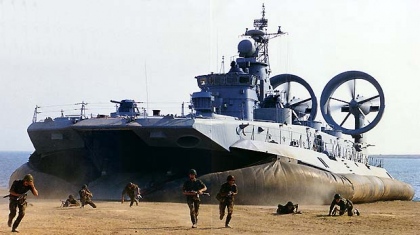
Ever since 2000, former National Defense minister Akis Tsohadzopoulos arranged the purchase of four Zubr aircraft-carriers from Russia and Ukraine. This ship, also known as hovercraft, has the potential for carrying 400 soldiers, tanks, and is built to attack from sea to land. What’s special about it is that it was designed for the endless shores of Russia. During 2001, when the carriers were received, it became evident that the hovercrafts are not suitable for the Aegean shores.
The concrete at the military port in Salamina came out to be too hard for those ships, and as a result after each mission they had to be repaired. This purchase cost the Greek taxpayers 67 billion Drachmas during 2000, apart from the cost for the repairs and support. The fall of the Apache helicopter on November 5th and the death of two pilots tragically proved that the Greek government spends outrageous amounts of money without taking into account the lives of those who have to run the defected machines. Very expensive and problematic have proven to be also the submarines, which tilt on one side, “blind” military planes, and frigates.
Managing the budget for military equipment becomes of importance on the financial crisis background. We note this, because a decision have been made for three billion Euros to be spent for the delivery of six new frigates and in few years it is expected for another three billion to be spent on the delivery of military planes. Just few days ago Prime-minister Kostas Karamanlis said that the national defense expenses for 2009 will be cut with 15%. He explained that the saved finances will be invested in strengthening the social expenses budget.
Despite the constant failures in purchasing military equipment, Greece is in an unpleasant financial situation in order to spend money for armament at this moment, when neighboring Turkey cuts the budget in order to be able to survive the crisis. Agreement for the purchasing of six frigates and military planes will be made in the next few months. The whole amount spent will be between six and seven billion Euros, a fact, which proves the urgent need for the right management of that money.
The way co-operations are going, the construction of the frigates will be done in the Skaramanga shipyard, which has German interests, and in case the tender is won by the French, the frigates will be built in the Elefsina shipyard. The most active diplomat about this is the French ambassador Christophe Farnaud. Towards mid August, when the Marine Higher Court was in session regarding the frigate building approval, this topic was a priority.
Of course, the French president Nicolas Sarkozy is following the subject very closely. Last year, during his visit in Athens, Mr. Sarkozy showed interest to the Greek Prime-minister Kostas Karamanlis in participating in both military equipment programs for 4th generation army planes and frigates. German ambassador Wolfgang Schulz and US ambassador Daniel Speckhard also show interest and are in contact regarding the programs.